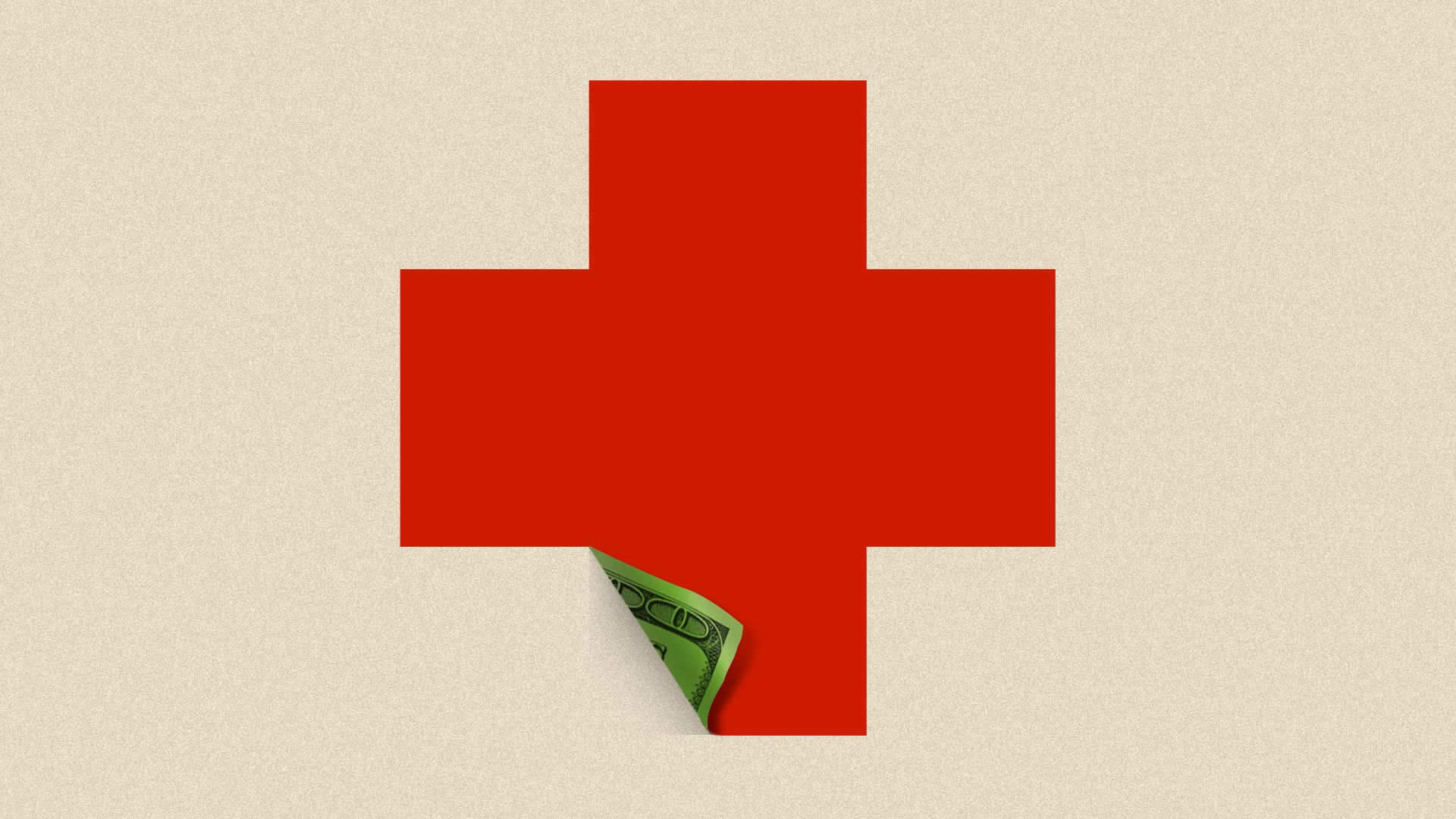Axios Vitals

January 14, 2020
Good morning. "Bachelor" fans, we've got a lot to discuss, beginning with the question of whose side you're on in the Champagne Crisis.
For the rest of you, we'll get right to it: Today's word count is 963, or a 4-minute read.
1 big thing: Hospitals' words and actions don't add up
Illustration: Aïda Amer/Axios
Axios' Bob Herman will bring you the inside scoop from the J.P. Morgan Healthcare Conference this week, beginning with this odd juxtaposition:
- Hospitals acknowledged to investors yesterday that their industry is contributing to patients' financial turmoil, but reassured those same investors that they were focused on growing their revenue.
What they're saying: "The number one cause of personal bankruptcy is our industry," Intermountain Healthcare CEO Marc Harrison, who is recovering from cancer treatment, said in one of the conference's opening sessions. "We have an absolute responsibility to make health care as affordable as possible."
- Intermountain CFO Bert Zimmerli said his system has taken a $100 million hit to its bottom line by lowering costs over the past two years — a fraction of Intermountain's $9 billion of annual revenue.
- He then touted the system's above-average 6% operating margin and explained that its collections from patients "have really been strong."
- Bon Secours Mercy Health CEO John Starcher, who helped complete the system's merger and has acquired other community hospitals, said BSMH will continue to look at other deals because "growth is necessary" — even though all reputable evidence suggests hospital mergers raise prices and don't improve care.
The big picture: Health care's high prices, especially for hospital services, eat away at everyone's paychecks and cause large out-of-pocket burdens. But health systems mostly haven't made a dent in changing those affordability concerns.
Go deeper: A reality check on hospital beds.
2. Day 1 at #JPM20
Want to hear more about what happened at the health care's cornerstone financial conference? Bob was running around and pulled out these nuggets.
Humana's cheering the death of the ACA tax.
- Humana CEO Bruce Broussard told investors at a small Goldman Sachs conference last week that the recent repeal of the Affordable Care Act's health insurance tax is "a substantial benefit to the company's stakeholders," according to a summary of the meeting from Goldman Sachs.
- This policy reversal will translate into hundreds of millions of dollars going toward Wall Street, but Broussard was more sheepish at JPM, where he would not say exactly how much of that money would be booked as profit.
Drug pricing pressure isn't going away.
- Regeneron CEO Leonard Schleifer, not shy about speaking his mind, doesn’t think there will be federal action on drug prices this year, due in part to the election. He said people have a right to be angry about drug prices, but "we do have to protect innovation."
- Ah yes, innovation.
Methodist is "done with that conversation" over collections.
- ProPublica and MLK50 reported last year that Methodist Le Bonheur Healthcare, a major not-for-profit hospital system in Memphis, Tenn., routinely sued low-income patients, which made Sen. Chuck Grassley angry enough to send Methodist a letter.
- Bob ran into Methodist CEO Michael Ugwueke, who said the system got an extension on Grassley's letter.
- When pressed further about Methodist's collections practices, which have since changed, Ugwueke responded: "We're done with that conversation."
3. Industry grapples with gene therapy cost


The gene therapy pipeline contains several drugs that are likely to cost the health care system billions of dollars in the near future, according to an a new CVS white paper.
The big picture: Drugmakers are already having to come up with creative ways to get paid for high-cost drugs, the Wall Street Journal reported yesterday, and that's before these new gene therapies hit the market.
Why it matters: These therapies will provide medical miracles to patients who have long gone without cures for debilitating diseases. Some may even save money in the long run, compared with the cost of lifelong treatment.
- But our health care system isn't built to absorb these kinds of upfront costs.
- The impact will be especially potent for small employers, which could be bankrupted by one sick employee who receives one of these therapies.
What's next: CVS is developing an additional insurance product that it says will help small employers guard against this, among other solutions it outlined in the white paper.
The bottom line: Policymakers are stuck on how to deal with existing prescription drug prices, but the private market is beginning to at least grapple with how it will handle the cost of future drugs.
Go deeper: Gene therapies' accessibility problem
4. The ACA is fine without the individual mandate
The Affordable Care Act's insurance market has not been materially affected by the elimination of the individual mandate penalty, the Kaiser Family Foundation's Drew Altman writes in today's column.
Why it matters: That fact undercuts a key argument in the lawsuit urging the courts to strike down the health care law.
The big picture: Healthy enrollees have not left the market in droves, premiums have not spiked and there has been no market death spiral.
Details: Premiums spiked in earlier years, as insurers figured out the market and anticipated the elimination of the penalty, but are declining by an average of 2–3% in 2020.
- Healthy people do not appear to have fled the market. ACA enrollees spent fewer days in the hospital in 2019 than in the previous four years.
- The financial health of insurers participating in the ACA marketplaces is stable, and dramatically improved since the early years of the ACA.
- Other elements of the ACA, such as the Medicaid expansion, appear to have been largely unaffected by the elimination of the penalty.
Flashback: ACA historians will remember that many critics of the mandate believed the penalty was too weak to drive the healthy into the marketplaces from the start.
There are still well-documented problems in the individual market.
- Policies are unaffordable for many people who do not receive subsidies, and insurer participation in some rural areas remains fragile.
- But these problems existed with the mandate penalty in effect.
5. Poll: Fewer people say vaccines are important
The share of Americans who say it's important to vaccinate children has fallen from 94% to 84% since 2001, according to a new Gallup survey.
The big picture: Misinformation about vaccines is still rampant — 46% of those polled said they weren't sure whether vaccines cause autism, despite numerous studies showing no apparent link, Axios' Marisa Fernandez writes.
Methodology: Results are based on telephone interviews conducted December 2-15, 2019 with a random sample of 1,025 — adults, ages 18+, living in all 50 U.S. states and the District of Columbia. The margin of sampling error is ±4 percentage points at the 95% confidence level.
Sign up for Axios Vitals

Healthcare policy and business analysis from Tina Reed, Maya Goldman, and Caitlin Owens.
